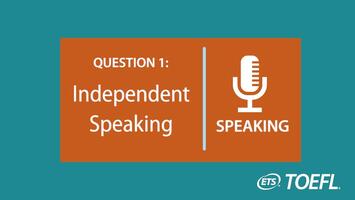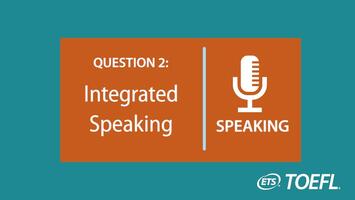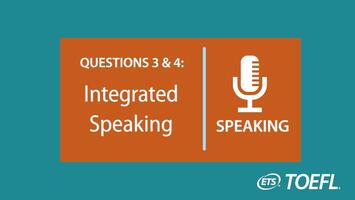TOEFL iBT Speaking Section
The TOEFL iBT Speaking section measures your ability to speak English effectively in academic settings. The four questions/tasks resemble real-life situations you might encounter both in and outside of a classroom.
Question 1: Independent Speaking Task — requires you to draw entirely on your own ideas, opinions and experiences when you respond.
Questions 2–4: Integrated Speaking Tasks — require you to combine your English-language skills — listening and speaking, or listening, reading and speaking — just as you would in or out of a classroom.
Prep time: You'll get 15–30 seconds of preparation time before each response, and your response will be 45 or 60 seconds long.
Speaking response: The Speaking section includes native-speaker English accents from North America, the U.K., New Zealand or Australia to better reflect the variety of accents you might encounter while studying abroad. The first question may have speech with any of these accents. The rest of the Speaking questions use North American accents.
Test time: It should take about 16 minutes to complete the Speaking section.
Scoring: Speaking tasks are scored based on the Speaking Scoring Guides (Rubrics) (PDF) by a combination of AI scoring and certified human raters. Raw scores are converted to a scaled section score of 0–30.
Speaking videos
Watch these videos to learn about the types of questions in the Speaking section, plus helpful tips.
Accents
The Speaking section includes native-speaker English accents from North America, the U.K., New Zealand or Australia to better reflect the variety of accents you might encounter while studying abroad. Only the first of the four items may have this accented speech.
Below are two examples, both of which use accents from the U.K. In each instance, the example is 15 seconds long, and you would have 45 seconds to respond.
| Audio File | Transcript |
|---|---|
| Item 1 (MP3) | If friends from another country were going to spend time in your country, what city or place would you suggest they visit? Using details and examples, explain why. |
Some people enjoy taking risks and trying new things. Others are not adventurous; they are cautious and prefer to avoid danger. Which behavior do you think is better? Explain why. |


